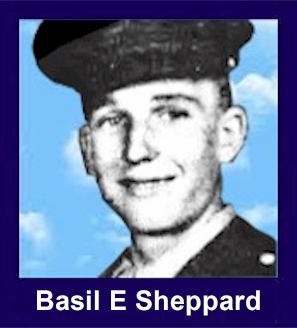The 35th Infantry Regiment Association salutes our fallen brother, Basil Edward Sheppard, 35774507, who died in the service of his country on May 6th, 1945 in Luzon. The cause of death was listed as KIA. At the time of his death Basil was 19 years of age. He was from Thayer, West Virginia.
The decorations earned by Basil Edward Sheppard include: the Combat Infantryman Badge, the Bronze Star, the Purple Heart, the Asiatic-Pacific Service Medal, and the World War II Victory Medal.
Nicknamed Little Shep. Radio man; killed by sniper Balete Pass. He enlisted 16 September 1943 and worked for Pinecrest Sanitarium.
Burial:
Hilltop Union Cemetery
Oak Hill
Fayette County
West Virginia, USA
(Following from Perry Ball's "Sgt Roach's Story"
THE SUDDEN DEATH OF PFC. "LITTLE SHEP"i
Highway 5, South of Balete Pass, Luzon, the Philippines, 6-7 May 1945
G Company was ordered to advance north along Highway 5 to outpost and guard a high bluff overlooking a portion of the highway on 6 May 1945. 1st Lt. Shepherd's 3rd Plt. was given the mission of securing the high bluff, which was approximately 1.8 miles south of Balete Pass. A pocket of Japanese resistance was encountered in a road bend about 200 yards from where G Company was assembled just before the 3rd Plt. left on its mission. The Japanese resistance consisted of approximately a platoon of Japanese dug in along the highway. The enemy positions consisted of three large caves dun in along the sides of a heavily wooded ravine from which they could block the highway with machine gun and rifle fire.
2nd LT Matula's 1st Plt. was given the mission of neutralizing the Japanese fire, allowing the 3rd Plt. to move up the highway. Matula disbursed the 1st Plt. on both sides of the highway and a heavy concentration of artillery, machine-gun, and rifle fire was laid down. The 3rd Plt. then passed through the 1st Plt. and advanced up the highway, at a run, in small groups. Pfc. Basil E. "Little Shep" Sheppard, the 3rd Plt. messenger and radio operator, was in the fourth group to leave. Pfc. Sheppard was in front of the draw, about half-way to a safe, covered position when he was hit by a Japanese sniper's bullet. The bullet passed through the front of his helmet and struck him in the forehead. He was killed instantly. The Japanese sniper may have picked Sheppard out of the group because he was carrying a heavy radio with an antenna.
---------------------------------------------------------------------------------------------------
Pfc. Sheppard was about half-way to a safe, covered position when he was hit by a Japanese sniper's bullet. The bullet passed through the front of his helmet and struck him in the forehead. He was killed instantly. The Japanese sniper may have picked Sheppard out of the group because he was carrying a radio with an antenna.
---------------------------------------------------------------------------------------------------
Matula saw Sheppard had fall on the highway in front of the ravine. He ordered his men to provide covering fire on the Japanese positions, left his protected position, and ran up the road in the face of concentrated sniper fire to Sheppard's assistance. Word also got back to Capt. Edenfield that "Shep" had been injured. Edenfield thought this was 1st LT Shepherd and moved forward to help the officer who served as both his executive officer and 2nd Plt. leader.ii
Matula arrived at Sheppard's side, lifted him up, and put his arm over his shoulder, but he was having difficulty moving his limp body. Edenfield arrived and put Sheppard's other arm over his shoulder. They had not taken ten steps to the rear before Edenfield was shot in the back of his left knee by a sniper's bullet. Edenfield let go of Sheppard and fell against Matula's shoulder. Matula realized by then that Sheppard was dead, so he let go of Sheppard, put Edenfield's arm over his shoulder, and helped him limp 50 yards to the G Company CP with bullets landing all around him.
This action was witnessed by 2nd Battalion Commander Lt. Col. Drew and 35th Regiment Commander Col. Larsen who were observing the action. Matula received the Bronze Star Medal with Oak Leaf Cluster for his heroic actions, devotion to duty, and saving the life of a wounded man on 6 May 1945.iii iv 2nd Lt. Matula, 1st Lt. Knight, SSGT Malinowski, Pvt. Leppke, a replacement, and Pvt. Robert L. Ervin, another replacement, were also wounded on this day.
A 10 July 1945 letter from G Company Commander Capt. Bernard G. Shepherd to Mrs. Pearl Sheppard, mother of Pfc. Basil E. "Little Shep" Sheppard, who was killed in action approximately 1.8 miles south of Balete Pass, Luzon, the Philippines, 6 May 1945. Commanding officers were expected to send letters to the next-of-kin of soldiers killed-in-action under their command, as soon as battlefield conditions permitted. This letter was sent more than two months after the death of Pfc. Sheppard. The delay was caused by the intensity of the ongoing campaign and the injury of former G Company Commander Capt. Robert A. "Blue Chip" Edenfield on the same date.
Letter courtesy of Harold Raymer.
|




